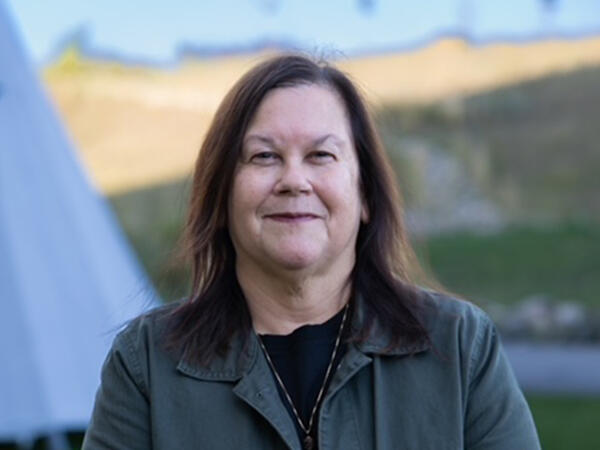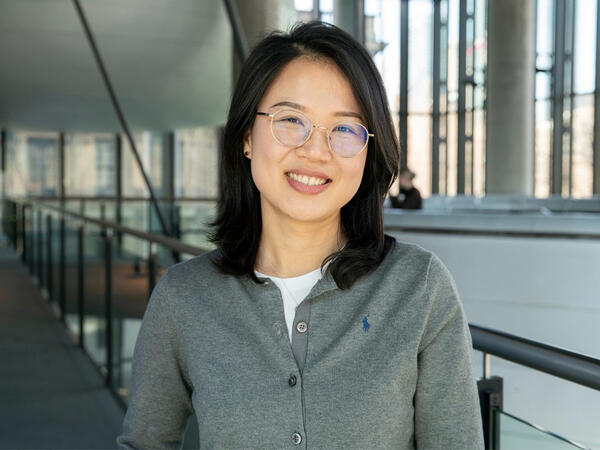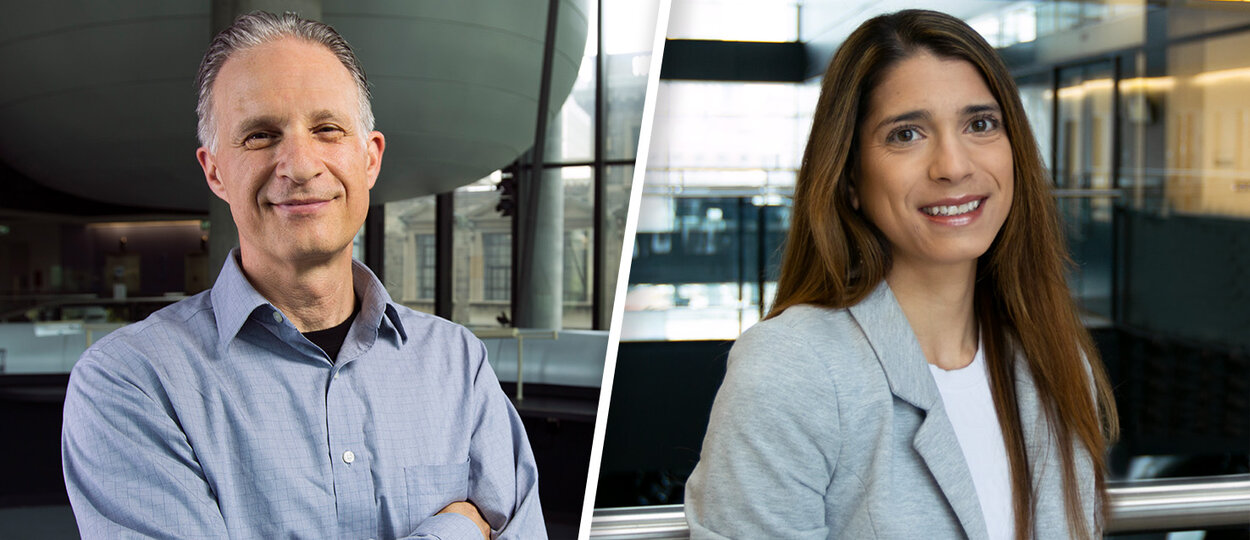Project supervisor Carlo DeAngelis (left) and co-lead Maria Marchese (right) are part of a research team using COVID-19 funding to survey oncology pharmacy practitioners at cancer centres across Canada.
While the COVID-19 pandemic has had a significant effect on pharmacy students – halting research projects, cancelling rotations and postponing licensing exams – many have been using their skills to make an impact against COVID-19. Five research teams led by students from the Leslie Dan Faculty of Pharmacy, have received U of T COVID-19 Student Engagement Awards, with a total of 150 student teams from across the university each receiving up to $3,000.
“This funding is incredibly important. It opens the door for us as students to lead new research projects,” says Maria Marchese, a Master of Science in Pharmacy student and pharmacist at Sunnybrook Health Sciences Centre who received one of the awards. “This has been an amazing opportunity to use this time to be part of something meaningful.”
Marchese and her co-lead Angela Heintzman, a PharmD student and pharmacist at Thunder Bay Regional Health Sciences Centre, are using the award to survey oncology pharmacy practitioners at cancer centres across Canada to learn how they have delivered virtual care during the pandemic. They will then use the survey responses, along with interviews and a process map developed by the Sunnybrook oncology pharmacy team, to develop a framework that can be used by cancer centres around the world to enhance patient care during and after the pandemic.
“We have the potential to make such an impact on patient care with this project”
“We have the potential to make such an impact on patient care with this project,” says Heintzman. “We can learn from the strategies that other groups are using. The whole process is so exciting.”
While many non-essential medical procedures were postponed during the peak of the pandemic, cancer treatments continued. Many patients maintained or even started chemotherapy during this time, and oncology pharmacists continued to counsel and support patients. But how they delivered these services changed rapidly, particularly because cancer patients are at high risk of COVID-19 complications.
“We really had to minimize contact with the patients,” says Marchese. “We were accustomed to interviewing the patient, collecting the medication history and explaining all the medications to them in person. We had to swap all that for virtual services.”
Survey will help identify best practices for virtual pharmacy care
While some in-person services remained, Marchese, her supervisor Carlo DeAngelis and the rest of the oncology pharmacy team at Sunnybrook began to offer virtual medication reviews and supportive care, day-before chemotherapy calls and follow up sessions over telephone and video conferencing. With patients now coming to the cancer centre alone, the virtual services allowed the pharmacy team to continue to include caregivers in the discussions, who are often critical for acting as a second set of ears and even translation when English is not the patient’s first language.
After the initial rush of changes to care in March, the Sunnybrook team wanted to explore how oncology pharmacy practitioners at other cancer centres were addressing the same challenges. “Other centres might have their own initiatives, and we wanted to learn what everyone is doing and describe the landscape of practice,” says Marchese.
Marchese and Heintzman’s survey will ask oncology pharmacy practitioners about how they delivered virtual care during the pandemic, as well as barriers and facilitators to success, which will help to identify best practices. They plan to share the findings through international oncology pharmacy associations in order to help change practice and virtual care globally, even beyond the pandemic. “Now we’re looking at which initiatives are most efficient and work best for patients,” says DeAngelis. “What can we take from this experience and move forward into day-to-day practice in the future?”
When students have opportunities like this to bring in funding, it enables the ability to bring new ideas forward, allows more innovation and expands the potential of your research program.”
While the team had already been working on developing a process map for Sunnybrook’s oncology pharmacy services, the new student award is helping them to develop and distribute the survey. “Having students come in with very different perspectives is critical and helps you to think in different ways,” says DeAngelis. “When students have opportunities like this to bring in funding, it enables the ability to bring new ideas forward, allows more innovation and expands the potential of your research program.”
Student groups lead diverse COVID-19 research
Christine Peragine, a research advisor on Marchese and Heintzman’s project, agrees that student funding is critical for helping them develop as researchers. “This funding for students gives them an opportunity to show leadership and initiative and gain project management skills,” she says. “It gives them the opportunity to take ownership.”
More than 1,000 students from across the university are involved in the 150 successful teams, including 16 from the Leslie Dan Faculty of Pharmacy. Pharmacy-led student teams were particularly successful in the competition, with a 62.5% success rate, and represent a diverse range of initiatives.
- Peter Zhang and a team of pharmacy and medical students are supplying health care facilities in the Greater Toronto and Hamilton area with 3D-printed face shields.
- Sameera Toenjes and a group of pharmacy students have created the COVID-19 Drug Evidence Initiative, reviewing, appraising and summarizing COVID-19 drug trials to help health professionals navigate the literature.
- Yousif Jaheinsha and Fadi Alkass are creating an educational video series highlighting COVID-19 topics from local and international pharmacist perspectives to raise awareness about pharmacists’ scope of practice during the pandemic.
- Andrea Massey and Nichelle Benny Gerard are working to improve U of T’s resources for students dealing with complex mental health medication management issues during the pandemic.
By Eileen Hoftyzer
More News
Image

Pharmacy alum sees change in acceptance of Indigenous cultures in health care
During Deborah Emery’s 40-year pharmacy career, she provided care in Sioux Lookout, Thunder Bay and Manitoulin Island.
Read More
Image

Grad to Watch: Jackie Fule Liu’s research focuses on better outcomes for diabetes patients
A recent PhD graduate, Jackie Fule Liu combines hands-on skill and big-picture thinking to help tackle diabetes care challenges.
Read More
Image

U of T community members recognized with Order of Canada
Congratulations to Dean Emeritus and Professor K. Wayne Hindmarsh on his appointment.
Read More
